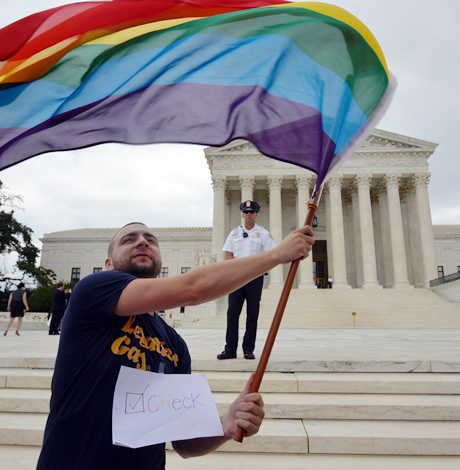National
Mich. court rules anti-trans discrimination is illegal, but not anti-gay discrimination
State AG, a lesbian, vows to appeal decision


A judge in Michigan has determined state civil rights law prohibits businesses from discriminating against customers for being transgender, but not on the basis of sexual orientation — a decision the state’s top lawyer on Thursday has vowed to appeal.
In a seven-page decision, Judge Christopher Murray this week ruled case law in Michigan makes clear anti-gay discrimination isn’t covered under the Elliot-Larsen Civil Rights Act, but with no clear precedent on anti-transgender discrimination, the state must defer to U.S. legal jurisprudence.
Although the Michigan Civil Rights Commission has determined anti-LGBTQ discrimination is a form of sex discrimination under state law, Murray reverses the panel with respect to anti-gay and anti-bi discrimination, citing Barbour v. Department of Social Services, a decision from the Michigan Court of Appeals in 1993.
“With respect to whether sexual orientation falls within the meaning of ‘sex’ under the ELCRA, the Court of Appeals has already concluded that it does not,” Murray writes. “Being a decision published after Nov. 1, 1990, Barbour is binding on this court…and must be followed.”
Murray recognizes the U.S. Supreme Court’s landmark decision this year in Bostock v. Clayton County, which found anti-LGBTQ discrimination is a form of sex discrimination, thus illegal in the workplace under Title VII of the Civil Rights Act of 1964. However, Murray concludes whether or not that ruling has implications for state law with regard to anti-gay discrimination is “a matter for the Court of Appeals, not this court.”
But with respect to anti-transgender discrimination, Murray reaches a different conclusion and finds “no guiding decision exists on the meaning of a provision within the ELCRA,” therefore he must defer to federal law and the Bostock ruling.
“Following the Bostock Court’s rationale, if defendants determine that a person treated someone who ‘identifies’ with a gender different than the gender that he or she was born as, then that is dissimilar treatment on the basis of sex, and they are entitled to redress that violation through the existing MDCR procedures,” Murray writes. “Nothing in the ELCRA would preclude that action.”
Murray takes note the companies asked him to declare enforcing the Elliot-Larsen Civil Rights Act to prohibit anti-LGBTQ discrimination would be inconsistent with freedom of religion under both the U.S. and Michigan Constitutions, but he declines to make that finding on the basis that the issue “has not been sufficiently briefed to resolve at this juncture.”
Michigan Attorney General Dana Nessel, a lesbian, vowed in a statement on Thursday she would appeal the decision to the Michigan Court of Appeals.
“I respectfully disagree with the Michigan Court of Claims on its ruling in this case as it relates to sexual orientation,” Nessel said. “Michigan courts have held that federal precedent is highly persuasive when determining the contours of the Elliott-Larsen Civil Rights Act, and federal courts across the country – including the U.S. Supreme Court in Bostock v Clayton County – have held that discrimination on the basis of sexual orientation is a form of sex discrimination.”
Nessel added she intends to argue on behalf of the Michigan Department of Civil Rights “all Michigan residents are entitled to protection under the law – regardless of their gender identity or sexual orientation – in our appeal to this decision.”
Plaintiffs in the lawsuit – Rouch World, which operates wedding venues in Southern Michigan and Uprooted Electrolysis in Marquette – are businesses denied services based on religious grounds to customers who were either a same-sex couple or an individual was transitioning their gender identity.
Rouch World declined to host a same-sex wedding in 2019 and Uprooted Electrolysis refused service to a transgender woman. Both companies civil rights faced complaints in state court for anti-LGBTQ discrimination.
Stacie Clayton, chair of the Michigan Civil Rights Commission, said in a statement the commission “welcomes” Nessel’s decision to appeal the ruling.
“We are encouraged that the Michigan Court of Claims has ruled the word ‘sex’ in ELCRA encompasses gender identity, but we will continue to argue that the U.S. Supreme Court was right to conclude, as did the Michigan Civil Rights Commission, that ‘sex’ in this context is also inclusive of sexual orientation,” Clayton said. “We are confident that Michigan’s appellate courts will do the same.”
Federal law would be no help to LGBTQ people in Michigan who face discrimination from business as customers. Although the Bostock applies to every federal law that bars sex discrimination, no federal law bars discrimination on the basis of sex in public accommodation, so the ruling doesn’t apply to businesses in this context.
The Equality Act, legislation to expand the prohibition on anti-LGBTQ discrimination under federal civil rights law, would make anti-LGBTQ and sex discrimination in public accommodations illegal and expand the definition of public accommodations under federal law to include retail stores, banks, transportation services and health care services.
h/t LGBTQ Nation
New York
Two teens shot steps from Stonewall Inn after NYC Pride parade
One of the victims remains in critical condition

On Sunday night, following the annual NYC Pride March, two girls were shot in Sheridan Square, feet away from the historic Stonewall Inn.
According to an NYPD report, the two girls, aged 16 and 17, were shot around 10:15 p.m. as Pride festivities began to wind down. The 16-year-old was struck in the head and, according to police sources, is said to be in critical condition, while the 17-year-old was said to be in stable condition.
The Washington Blade confirmed with the NYPD the details from the police reports and learned no arrests had been made as of noon Monday.
The shooting took place in the Greenwich Village neighborhood of Manhattan, mere feet away from the most famous gay bar in the city — if not the world — the Stonewall Inn. Earlier that day, hundreds of thousands of people marched down Christopher Street to celebrate 55 years of LGBTQ people standing up for their rights.
In June 1969, after police raided the Stonewall Inn, members of the LGBTQ community pushed back, sparking what became known as the Stonewall riots. Over the course of two days, LGBTQ New Yorkers protested the discriminatory policing of queer spaces across the city and mobilized to speak out — and throw bottles if need be — at officers attempting to suppress their existence.
The following year, LGBTQ people returned to the Stonewall Inn and marched through the same streets where queer New Yorkers had been arrested, marking the first “Gay Pride March” in history and declaring that LGBTQ people were not going anywhere.
New York State Assemblywoman Deborah Glick, whose district includes Greenwich Village, took to social media to comment on the shooting.
“After decades of peaceful Pride celebrations — this year gun fire and two people shot near the Stonewall Inn is a reminder that gun violence is everywhere,” the lesbian lawmaker said on X. “Guns are a problem despite the NRA BS.”
New York
Zohran Mamdani participates in NYC Pride parade
Mayoral candidate has detailed LGBTQ rights platform

Zohran Mamdani, the candidate for mayor of New York City who pulled a surprise victory in the primary contest last week, walked in the city’s Pride parade on Sunday.
The Democratic Socialist and New York State Assembly member published photos on social media with New York Attorney General Letitia James, telling followers it was “a joy to march in NYC Pride with the people’s champ” and to “see so many friends on this gorgeous day.”
“Happy Pride NYC,” he wrote, adding a rainbow emoji.
Mamdani’s platform includes a detailed plan for LGBTQ people who “across the United States are facing an increasingly hostile political environment.”
His campaign website explains: “New York City must be a refuge for LGBTQIA+ people, but private institutions in our own city have already started capitulating to Trump’s assault on trans rights.
“Meanwhile, the cost of living crisis confronting working class people across the city hits the LGBTQIA+ community particularly hard, with higher rates of unemployment and homelessness than the rest of the city.”
“The Mamdani administration will protect LGBTQIA+ New Yorkers by expanding and protecting gender-affirming care citywide, making NYC an LGBTQIA+ sanctuary city, and creating the Office of LGBTQIA+ Affairs.”
U.S. Supreme Court
Supreme Court upholds ACA rule that makes PrEP, other preventative care free
Liberal justices joined three conservatives in majority opinion

The U.S. Supreme Court on Friday upheld a portion of the Affordable Care Act requiring private health insurers to cover the cost of preventative care including PrEP, which significantly reduces the risk of transmitting HIV.
Conservative Justice Brett Kavanaugh authored the majority opinion in the case, Kennedy v. Braidwood Management. He was joined by two conservatives, Chief Justice John Roberts and Justice Amy Coney Barrett, along with the three liberal justices, Sonia Sotomayor, Elena Kagan, and Ketanji Brown-Jackson.
The court’s decision rejected the plaintiffs’ challenge to the Affordable Care Act’s reliance on the U.S. Preventative Services Task Force to “unilaterally” determine which types of care and services must be covered by payors without cost-sharing.
An independent all-volunteer panel of nationally recognized experts in prevention and primary care, the 16 task force members are selected by the secretary of the U.S. Department of Health and Human Services to serve four-year terms.
They are responsible for evaluating the efficacy of counseling, screenings for diseases like cancer and diabetes, and preventative medicines — like Truvada for PrEP, drugs to reduce heart disease and strokes, and eye ointment for newborns to prevent infections.
Parties bringing the challenge objected especially to the mandatory coverage of PrEP, with some arguing the drugs would “encourage and facilitate homosexual behavior” against their religious beliefs.
-

 U.S. Supreme Court4 days ago
U.S. Supreme Court4 days agoSupreme Court upholds ACA rule that makes PrEP, other preventative care free
-

 U.S. Supreme Court4 days ago
U.S. Supreme Court4 days agoSupreme Court rules parents must have option to opt children out of LGBTQ-specific lessons
-

 National5 days ago
National5 days agoEvan Wolfson on the 10-year legacy of marriage equality
-

 Congress5 days ago
Congress5 days agoSenate parliamentarian orders removal of gender-affirming care ban from GOP reconciliation bill











